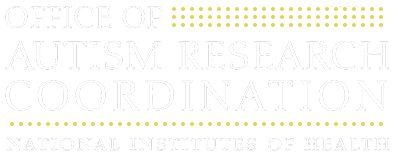| |

 A Proclamation on World Autism Awareness Day, 2023
A Proclamation on World Autism Awareness Day, 2023
In honor of World Autism Awareness Day, President Joseph R. Biden released a proclamation to recognize the achievements of neurodiverse people and to reiterate his Administration’s commitment to supporting the equal rights and dignity of all those on the autism spectrum. President Biden highlights recent achievements in the autism field, including support for home- and community-based services, the reauthorization of Kevin and Avonte’s Law, and boosting employment opportunities.
|
|
| |
|
| |
| |
|
|
| |
| |
| |

 OARC Special Event for Autism Awareness Month - A Portrait of Autism: Artists and Their Works
OARC Special Event for Autism Awareness Month - A Portrait of Autism: Artists and Their Works
The National Institute of Mental Health (NIMH) and the Office of Autism Research Coordination (OARC) are pleased to host their 10th Annual Autism Awareness Month Special Event, A Portrait of Autism: Artists and Their Works. The event will feature 4 artists, who will talk about how their experiences as autistic individuals have shaped their artistic expression. The event will include a sampling of their artwork and a Q&A with the artists.
|
|
| |
|
| |
| |
| |

 American Indian/Alaska Native Parents of Children with Autism Panel
American Indian/Alaska Native Parents of Children with Autism Panel
In celebration of Autism Awareness Month, the purpose of this webinar is to provide American Indian/Alaska Native (AI/AN) parents the opportunity to share their stories as parents of children with Autism. This webinar will serve as a safe place for healthcare providers and community members to become more aware of the unique experiences of AI/AN families and to ask questions.
|
|
| |
|
| |
| |
| |

 Identifying Early Brain Markers in Infancy in Autism and Associated Developmental Disabilities
Identifying Early Brain Markers in Infancy in Autism and Associated Developmental Disabilities
The National Institute of Environmental Health Sciences (NIEHS) will host a special event titled "Identifying Early Brain Markers in Infancy in Autism and Associated Developmental Disabilities" for World Autism Awareness Month on Thursday, April 20, 2023 from 1:00 - 2:00 p.m. ET. This event will feature Dr. Mark Shen, Ph.D. from the University of North Carolina at Chapel Hill.
|
|
| |
|
| |
| |
|
|
| |
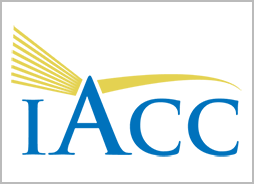
 April IACC Full Committee Meeting
April IACC Full Committee Meeting
The April Interagency Autism Coordinating Committee (IACC) meeting will be held Tuesday, April 4, 2023 from 10:00 a.m. to 5:00 p.m. ET. The meeting will be virtual and is free and open to the public. Discussion topics will include updates from the Centers for Disease Control and Prevention on autism prevalence data and a panel presentation on racial equity and racial/ethnic disparities in autism. For more information, go to the meeting page.
|
|
| |
|
| |
| |
| |
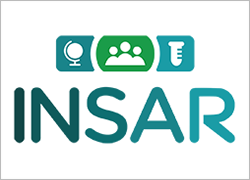
 INSAR 2023 Annual Meeting
INSAR 2023 Annual Meeting
INSAR 2023 will be an in-person event, held in Stockholm, Sweden from May 3 - 6, 2023. Scientists from around the world will present the latest advances in the field of autism research. Registration and preliminary schedule are available online.
|
|
| |
|
| |
| |
| |
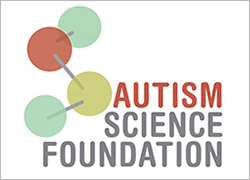
 ASF Annual Day of Learning
ASF Annual Day of Learning
The 2023 Autism Science Foundation (ASF) Day of Learning took place on March 30, 2023. ASF’s Days of Learning are TED-style science conferences that bring top researchers together with autism stakeholders to share cutting-edge research findings and to discuss the issues that matter most to families. Recordings of the presentations will be available on ASF’s website.
|
|
| |
|
| |
| |
| |
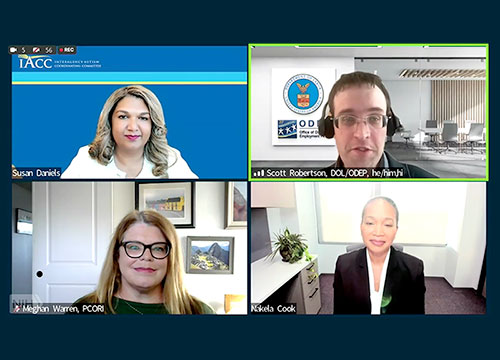
 January IACC Full Committee Meeting
January IACC Full Committee Meeting
The January Interagency Autism Coordinating Committee (IACC) meeting was held Wednesday, January 18, 2023. The virtual meeting included approval of the 2021-2023 IACC Strategic Plan for Autism Research, Services, and Policy, a discussion on evidence for supportive services, and a presentation from PCORI. A full recording is available on the meeting page.
|
|
| |
|
| |
| |
| |

 Canadian Autism Leadership Summit 2023
Canadian Autism Leadership Summit 2023
This year’s Canadian Autism Leadership Summit (CALS) will take place April 17–19, 2023, and will be accessible both in-person and virtually. CALS works to build a more inclusive Canada by advancing a robust national autism strategy throughout the country. The four themes of this year’s Summit are international strategies, post-secondary education, intersectional issues, and housing. Registration is available here.
|
|
| |
|
| |
| |
| |

 Ableism in Medicine and Clinical Research
Ableism in Medicine and Clinical Research
The Eunice Kennedy Shriver National Institute of Child Health and Human Development is hosting a 2-day, virtual workshop on the effects of ableism in medicine. The workshop focuses on awareness and research opportunities to mitigate the effect of “ableism”—defined by the American Psychological Association as prejudice and discrimination aimed at people with disabilities—in both clinical care and the biomedical and behavioral research enterprise. The workshop is free, open to the public, and will take place April 27-28, 2023. Register to attend here.
|
|
| |
|
| |
| |
|
|
| |
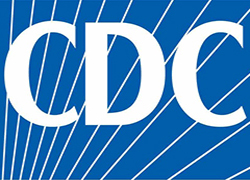
 Autism Prevalence Higher, According to Data from 11 ADDM Communities
Autism Prevalence Higher, According to Data from 11 ADDM Communities
The U.S. Centers for Disease Control and Prevention’s Morbidity and Mortality Weekly Report (MMWR) found that 1 in 36 (2.8%) eight-year-old children were diagnosed with autism in 2020. This is the first time Black, Hispanic, and Asian/Pacific Islander children showed a higher prevalence than white children, which suggests a lessening of racial disparities in autism identification. A second report on 4-year-old children in the same 11 communities highlights the impact of COVID-19, showing disruptions in progress in early autism detection. In the early months of the pandemic, 4-year-old children were less likely to have an evaluation or be identified with ASD than 8-year-old children when they were the same age.
|
|
| |
|
| |
| |
| |

 Fact Sheet: The Biden-Harris Administration’s Work to Support Black Disabled Americans
Fact Sheet: The Biden-Harris Administration’s Work to Support Black Disabled Americans
The Biden-Harris Administration has taken historic action to advance equity through Executive Orders, administrative actions, and the provision of funding and resources. Across the whole of the federal government, agencies are examining their policies and programs for disparities that have made it difficult for Black Americans and people with disabilities to thrive in their communities – at work, at school, and at home. This fact sheet discusses topics such as Apprenticeships, Financial Empowerment, Social Security, and equitable education and healthcare.
|
|
| |
|
| |
| |
| |

 Social Security Proposes Change To SSI Benefits
Social Security Proposes Change To SSI Benefits
The Social Security Administration is seeking to update their regulations to exclude food from the way they calculate In-Kind Support and Maintenance. Currently, Supplemental Security Income (SSI) beneficiaries can have their payments reduced if someone regularly provides groceries and meals. This change would improve the equitable treatment of food assistance within the SSI program. The proposed rule would also include updates to its definition of income. Public comment on this proposed rule is open until April 17, 2023.
|
|
| |
|
| |
| |
|
|
| |
| |
|
|
| |
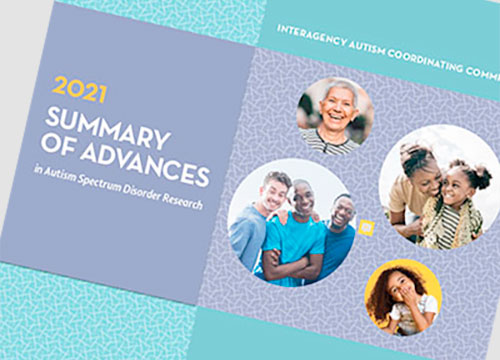
 2021 Summary of Advances Highlights Notable Autism Research from 2021
2021 Summary of Advances Highlights Notable Autism Research from 2021
The Interagency Autism Coordinating Committee (IACC) has released its 2021 Summary of Advances in Autism Research. This publication provides short, plain language summaries of the top 20 advances in autism biomedical and services research selected by members of the IACC. In addition, the IACC has released an accompanying easy-read version that summarizes the full publication in a briefer, more accessible format.
|
|
| |
|
| |
| |
| |

 Graduation Rate For Students With Disabilities On The Rise
Graduation Rate For Students With Disabilities On The Rise
According to a new report from the U.S. Department of Education (ED)’s National Center for Education Statistics, the number of students with disabilities graduating from high school has increased nationally. The high school graduation rate for this population was 70.6% for the 2019-2020 academic year, which is up from 68.2% the year prior. Graduation rates vary by state. ED indicated that part of this variation can be explained by how states define and calculate certain subgroups.
|
|
| |
|
| |
| |
| |

 Latest National Autism Indicators Report Explores Autistic Individuals’ Use of Medicaid Across the Lifespan
Latest National Autism Indicators Report Explores Autistic Individuals’ Use of Medicaid Across the Lifespan
The National Autism Indicators Report: Introduction to Medicaid and Autism explores how autistic individuals use Medicaid and how their service use changes across the life span, from infants to older adults. The report uses data from the from the Centers for Medicaid and Medicare Services (CMS) from 2008-2016. The number of autistic people enrolled in Medicaid tripled during this time to nearly 600,000, almost 70% of whom were children. The focus of service use changes across the lifespan, but little is published on how autistic adults over age 65 use long-term services and supports. This is the first report in the A.J. Drexel Autism Institutes' new Policy Insight series of National Autism Indicators Reports.
|
|
| |
|
| |
| |
| |

 Employment rate for Americans with disabilities reached record high in 2022
Employment rate for Americans with disabilities reached record high in 2022
In 2022, the employment rate for Americans with disabilities hit a record high of 21.3%. These data come from the U.S. Department of Labor’s Bureau of Labor Statistics. People with disabilities tend to have high levels of unemployment and face numerous barriers to work. The data also include information about education, industry, full-time versus part-time employment.
|
|
| |
|
